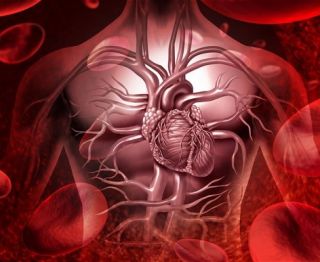Anxiety
Negative Emotions Can Increase the Risk of Heart Disease
Anger, anxiety, and depression can trigger inflammation linked to heart disease.
Posted May 6, 2014

We all know from life experience that negative emotions like stress, anxiety, fear, depression, and anger each have tell-tale bodily warning signs attached to them. Recently, researchers have discovered that there is a strong link between negative emotional states, brain circuitry, inflammation, and an increased risk of heart disease.
Heart disease is the leading cause of death in the United States. Scientists at the University of Pittsburgh have found that how well someone responds to negative emotions is linked to his or her risk of having a heart attack or stroke. This study offers new clues for psychological interventions that could reduce the risk of cardiovascular disease.
The May 2014 study titled “An Inflammatory Pathway Links Atherosclerotic Cardiovascular Disease Risk to Neural Activity Evoked by the Cognitive Regulation of Emotion” was published by Elsevier in the journal Biological Psychiatry.
Dr. Peter Gianaros, first author of the study, is an Associate Professor with the Biological and Health as well as Clinical Psychology programs in the Department of Psychology at the University of Pittsburgh. Gianaros is doing cutting edge research on the mind-body connection and how physical well-being is linked to psychological and social factors.
His research uses a combination of psycho-physiological methods combined with brain imaging to identify the neural correlations to cardiovascular stress reactions during times of anxiety, depression, anger, etc.
In this study, Dr. Gianaros wanted to explore the neural responses triggered by psychological stress and emotion regulation to predict current levels of preclinical atherosclerosis. Stroke and heart attacks are the result of progressive damage to bloodvessels via a process called atherosclerosis.
What is Atherosclerosis?

Plaque hardens and narrows the arteries.
Atherosclerosis—also known as "hardening of the arteries"—is a disease in which plaque builds up inside your arteries. Over time, this plaque hardens and narrows your arteries which reduces the flow of blood and can lead to serious problems, including heart attack, stroke, and death. Atherosclerosis progresses more quickly when there are high levels of “pro-inflammatory cytokines” like interleukin-6 in the body.
Persistant negative emotions are believed to increase the risk for atherosclerosis and cardiovascular disease by raising the levels of inflammatory causing chemicals in the body. In future studies, the researchers at University of Pittsburgh hope to identify the specific neural circuitry underlying this process.
Peter Gianaros has a hunch that the same brain areas involved in emotions are also involved in sensing and regulating levels of inflammation in the body. The hypothesis is that brain activity linked to negative emotions—and the psychological ability to regulate negative emotions—is related to atherosclerosis and an increased risk of cardiovascular disease.
Interleukin-6 Can Trigger Systemic Inflammation

To conduct the study, Gianaros and his colleagues recruited 157 healthy adult volunteers who were asked to regulate their emotional reactions to unpleasant pictures while their neural activity was measured with functional brain imaging.
The researchers also used a non-invasive method to scan their arteries for signs of atherosclerosis and assess heart disease risk and measured levels of inflammation in the bloodstream. Individuals who showed the most robust brain activity when regulating their negative emotions also exhibited higher levels of interleukin-6.
Interleukin-6 is a cytokine that triggers inflammation and leads to increased thickness of the carotid artery wall, a marker of atherosclerosis. The inflammation levels seen across the board paralleled signs of atherosclerosis along with more brain activity during emotion regulation. Gianaros believes that these findings show that the same brain regions used to regulate emotions also regulate inflammatory responses.
A Sense of Humor, Mindfulness, and Meditation Can Help Reduce the Risk of Heart Disease

This study is important because it reaffirms that heart health goes beyond lifestyle choices like diet, exercise, being a non-smoker... Stress reduction and increasing positive emotions can reduce inflammation and the risk of heart disease.
Daily practices of laughter and levity, mindfulness-meditation, equanimity, and maintaining strong social connections can all be part of a brain and body based prevention strategy that will improve long-term psychological and physical well-being.
Dr. Gianaros and his colleagues are optimistic that if they can hone in on the specific mechanisms that link the brain and body, they may be able to create interventions that reverse the risk of heart disease caused by unregulated negative emotions.
If you’d like to read more on this topic, check out my Psychology Today blog posts:
- "Mindfulness Made Simple"
- "Rage Attacks Can Trigger Heart Attacks"
- "The Neurobiology of Grace Under Pressure"
- "Emotional Distress Can Speed Up Cellular Aging"
- “Meditation Has the Power to Alter Your Genes”
- "Yoga Has Potent Health Benefits"
- “Compassion Can Be Trained”
- ”How Does Meditation Reduce Anxiety At a Neural Level?”
- "Neuroscientists Discover the Roots of 'Fear-Evoked Freezing'"
- "Cortisol: Why "The Stress Hormone" Is Public Enemy No. 1"
- "Chronic Stress Can Damage Brain Structure and Connectivity"
- "Neuroscientists Confirm That Our Loved Ones Become Ourselves"
- "4 Simple Ways to Replace Hostility With Equanimity”
Follow me on Twitter @ckbergland for updates on The Athlete’s Way blog posts.




